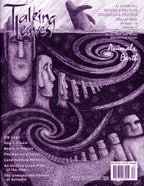
The Unexplained Powers of Animals
By Rupert Sheldrake

People experienced with animals often tell stories that suggest the existence of forms of communication at present unknown to science. Surprisingly little research has been done on these phenomena. Biologists have been inhibited by the taboo against "the paranormal," and psychical researchers and parapsychologists have with few exceptions confined their attention to human beings.
For the last five years, with the help of hundreds of animal trainers, shepherds, blind people with guide dogs, veterinarians, and pet owners, I have been investigating some of these unexplained powers of animals. There are three major categories of seemingly mysterious perceptiveness: namely telepathy, the sense of direction, and premonition.
As skeptics rightly point out, some of these responses could be explained in terms of routine expectations, subtle sensory cues, chance coincidence, and selective memory, or put down to the imaginations of doting pet owners. These are reasonable hypotheses, but they should not be accepted in the absence of any evidence. To test these possibilities, it is necessary to do experiments.
My colleagues and I have concentrated on the phenomenon of dogs that know when their owners are coming home. Many pet owners have observed that their animals seem to anticipate the arrival of a member of the household, often 10 minutes or more in advance. The pets typically wait at a door, window or gate. In random household surveys in Britain and America, an average of 51 per cent of dog owners and 30 per cent of cat owners said they had noticed such anticipatory behavior.
The dog I have investigated in most detail is a terrier called Jaytee, who belongs to Pam Smart, in Ramsbottom, Greater Manchester. Pam adopted Jaytee from Manchester Dogs' Home in 1989 when he was still a puppy, and soon formed a close bond with him. In 1991, when Pam was working as a secretary at a school in Manchester, she left Jaytee with her parents, who noticed that the dog went to the French window almost every weekday at about 4.30 pm, around the time she set off, and waited there until she arrived some 45 minutes later. She worked routine office hours, so the family assumed that Jaytee's behavior depended on some kind of time sense.
In 1993, when her job was made redundant, Pam became unemployed, no longer tied to any regular pattern of activity. Her parents did not usually know when she would be coming home, but Jaytee still anticipated her return. In 1994 Pam read an article about my research and volunteered to take part. In more than 100 experiments, we videotaped the area by the window where Jaytee waited during Pam's absences, providing a continuous, timecoded record of his behavior which was scored "blind" by a third party who did not know the details of the experiments. To check that Jaytee was not reacting to the sound of Pam's car or other familiar vehicles, we investigated whether he still anticipated her arrival when she traveled by unusual means: by bicycle, by train, and by taxi. He did.
We also carried out experiments in which Pam set off at times selected at random after she had left home, communicated to her by means of a telephone pager. In these experiments, Jaytee still started waiting at the window around the time Pam set off, even though no one at home knew when she would be coming. The odds against this being a chance effect were more than 100,000 to one. Jaytee behaved in a very similar way when he was tested repeatedly by skeptics anxious to debunk his abilities. The evidence indicates that Jaytee was reacting to Pam's intention to come home even when she was many miles away. Telepathy seems the only hypothesis that can account for the facts.
Other kinds of animal telepathy can also be investigated experimentally, for example the apparent ability of dogs to know when they are going to be taken for walks. In these experiments the dogs are kept in a separate room or outbuilding and videotaped continuously. Meanwhile their owner, at a randomly selected time, thinks about taking them for a walk and then five minutes later does so. Our experiments have shown dogs exhibiting obvious excitement when their owner is thinking about taking them out, although they could not have known this by normal sensory means. They did not manifest such excitement at other times.
There is much potential for further research on animal telepathy. And if domestic animals are telepathic with their human owners, then it seems very likely that animals are telepathic with each other, and that this may play an important part in the wild. Some naturalists have already suggested that the coordination of flocks of birds and herds of animals may involve something like telepathy, as may communication between members of a pack of wolves.
Sometimes animals "home" not to places but to people. Some dog owners who have gone away and left their pet behind are found by the animal in distant places to which it has never been before. Tracking the person by smell or random searches may explain some cases when the distances are short, but in others the only feasible explanation seems to be some kind of invisible connection between the animal and the person to whom they are bonded.
All three types of perceptiveness--telepathy, the sense of direction, and premonitions--seem better developed in non-human species like dogs than they are in people. Nevertheless they occur in the human realm too, but they seem to be better developed in traditional cultures than in the modern industrial world. Maybe we have lost some of these abilities because we no longer need them: telephones and television have superseded telepathy; maps and global positioning systems have replaced the sense of direction. And perceptiveness is not cultivated in our educational system. Indeed the existence of unexplained powers is not only ignored but often denied. Nevertheless, human "sixth senses" have not gone away. They look more natural, more biological, when they are seen in the light of animal behavior. Much that appears "paranormal" at present looks normal when we expand our ideas of normality. But we need to expand our view of physics as well as of biology if these phenomena are to be explained at a more fundamental level.
Dr. Rupert Sheldrake was a Fellow of Clare College, Cambridge and a Research Fellow of the Royal Society in biochemistry. He is currently a Fellow of the Institute of Noetic Sciences in Sausalito, California, and lives in London. His book Dogs That Know When Their Owners Are Coming Home, and Other Unexplained Powers of Animals is published by Crown Books, New York. His web site is www.sheldrake.org.
Rupert Sheldrake will be co-teaching a course at Schumacher College, Devon, UK from February 9-28, 2003, entitled "Animal Magic: Science Beyond the Microscope." For more information, contact the Administrator, Schumacher College, The Old Postern, Dartington, Devon TQ9 6EA, telephone: 01803 865 934, email: [email protected], website: www.schumachercollege.org.uk.
Schumacher College is an international center for ecological studies that welcomes course participants from all over the world. The College runs short courses on ecological issues and a one-year MSc in Holistic Science.
�2002 Talking Leaves
Winter 2003
Volume 12, Number 4
Animals, Earth
We welcome your letters!
For a sample copy of the Winter 2003 issue, "Animals, Earth," send $6 to
